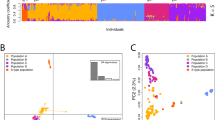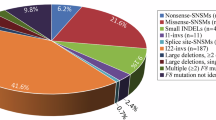Abstract
A re-emerging strategy in the search for disease susceptibility genes is the evaluation of candidate genes, which are thought to play a role in disease pathogenesis. Candidate genes are screened for single nucleotide polymorphisms (SNPs) in a case–control study. The factor V Leiden (FVL) mutation (1691G → A in the F5 gene) is an important risk factor for venous thrombosis. We asked ourselves whether the FVL mutation would have been found using the candidate gene approach in the absence of prior knowledge of the haplotype structure of the F5 gene. We typed four SNPs in the F5 gene in the Leiden Thrombophilia study, that is, promoter (99930G → A), exon 13 (55907A → G), exon 16 (42855A → G), and intron 19 (37833T → G). These SNPs were known to have different population frequencies, making their presence in distinct haplotypes likely. None of these SNPs has previously been associated with venous thrombotic risk. Subsequently we derived haplotypes. One haplotype was clearly more frequent in patients than controls (GAAT; 20 versus 9%), suggesting that a polymorphism in or near the F5 gene in this haplotype is associated with an increased thrombotic risk. If we had sequenced the F5 gene in patients homozygous for this haplotype, in order to locate the possible causal polymorphism, we would have found that 16 (76%) patients were homozygous or heterozygous for a missense mutation in exon 10 (1691G → A), which predicts the replacement of Arg506 by Gln in one of the cleavage sites for activated protein C, a mutation that we now know as the FVL mutation.
Similar content being viewed by others
Log in or create a free account to read this content
Gain free access to this article, as well as selected content from this journal and more on nature.com
or
References
Ioannidis JPA, Ntzani EE, Trikalinos TA, Contopoulos-Ioannidis DG : Replication validity of genetic association studies. Nat Genet 2001; 29: 306–309.
Hirschhorn JN, Lohmueller K, Byrne E, Hirschhorn K : A comprehensive review of genetic association studies. Genet Med 2002; 4: 45–61.
Lane DA, Grant PJ : Role of hemostatic gene polymorphisms in venous and arterial thrombotic disease. Blood 2000; 95: 1517–1532.
Cardon LR, Bell JI : Association study designs for complex diseases. Nat Rev Genet 2001; 2: 91–99.
Risch N, Merikangas K : The future of genetic studies of complex human diseases. Science 1996; 273: 1516–1517.
Rosendaal FR : Venous thrombosis: a multicausal disease. Lancet 1999; 353: 1167–1173.
Dahlbäck B, Carlsson M, Svensson PJ : Familial thrombophilia due to a previously unrecognized mechanism characterized by poor anticoagulant response to activated protein C: prediction of a cofactor to activated protein C. Proc Natl Acad Sci USA 1993; 90: 1004–1008.
Bertina RM, Koeleman BP, Koster T et al: Mutation in blood coagulation factor V associated with resistance to activated protein C. Nature 1994; 369: 64–67.
Lunghi B, Iacoviello L, Gemmati D et al: Detection of new polymorphic markers in the factor V gene: association with factor V levels in plasma. Thromb Haemost 1996; 75: 45–48.
Cox MJ, Rees DC, Martinson JJ, Clegg JB : Evidence for a single origin of factor V Leiden. Br J Haematol 1996; 92: 1022–1025.
Zivelin A, Griffin JH, Xu X et al: A single genetic origin for a common Caucasian risk factor for venous thrombosis. Blood 1997; 15: 397–402.
Zöller B, Hillarp A, Dahlbäck B : Activated protein C resistance caused by a common factor V mutation has a single origin. Thromb Res 1997; 85: 237–243.
Castoldi E, Lunghi B, Mingozzi F, Iannou P, Marchetti G, Bernardi F : New coagulation factor V gene polymorphisms define a single and infrequent haplotype underlying the factor V Leiden mutation in Mediterranean populations and Indians. Thromb Haemost 1997; 78: 1037–1041.
Cripe DC, Moore KD, Kane WH : Structure of the gene for human coagulation factor V. Biochemistry 1992; 31: 3777–3785.
Koster T, Rosendaal FR, de Ronde H, Briët E, Vandenbroucke JP, Bertina RM : Venous thrombosis due to poor anticoagulant response to activated protein C: Leiden Thrombophilia Study. Lancet 1993; 342: 1503–1506.
Schneider S, Roessli D, Excoffier L : A software for population genetics data analysis Version 2.000. Switzerland: Genetics and Biometry Laboratory, University of Geneva; 2000.
Excoffier L, Slatkin M : Maximum-likelihood estimation of molecular haplotype frequencies in a diploid population. Mol Biol Evol 1995; 12: 921–927.
Souto JC : Genetic studies in complex disease: the case prolinkage studies. J Thromb Haemost 2003; 1: 1676–1678.
Rosendaal FR : Genetic studies in complex disease: the case proassociation studies. J Thromb Haemost 2003; 1: 1679–1680.
Rosendaal FR, Doggen CJ, Zivelin A et al: Geographic distribution of the 20210 G to A prothrombin variant. Thromb Haemost 1998; 79: 706–708.
Acknowledgements
The Leiden Thrombophilia study was supported by the Netherlands Heart Foundation (Grant No 89.063).
Author information
Authors and Affiliations
Corresponding author
Rights and permissions
About this article
Cite this article
van Hylckama Vlieg, A., Sandkuijl, L., Rosendaal, F. et al. Candidate gene approach in association studies: would the factor V Leiden mutation have been found by this approach?. Eur J Hum Genet 12, 478–482 (2004). https://doi.org/10.1038/sj.ejhg.5201183
Received:
Revised:
Accepted:
Published:
Issue date:
DOI: https://doi.org/10.1038/sj.ejhg.5201183
Keywords
This article is cited by
-
Strengthening the reporting of genetic association studies (STREGA): an extension of the STROBE statement
European Journal of Epidemiology (2009)
-
Strengthening the reporting of genetic association studies (STREGA): an extension of the STROBE Statement
Human Genetics (2009)
-
Generalizing Terwilliger's likelihood approach: a new score statistic to test for genetic association
BMC Genetics (2007)



